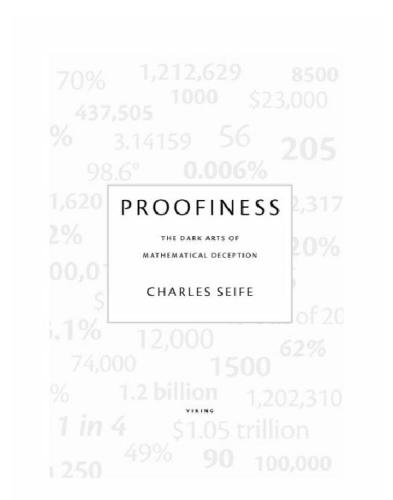
Proofiness
The Dark Arts of Mathematical Deception
کتاب های مرتبط
- اطلاعات
- نقد و بررسی
- دیدگاه کاربران
نقد و بررسی

July 12, 2010
Science journalist Seife (Zero) borrows the title of his book from comedian Stephen Colbert's well-known term "truthiness." Seife defines proofiness as "the art of using bogus mathematical arguments to prove something that you know in your heart is true—even when it's not." He presents a rogue's gallery of shady figures: Potemkin numbers, or fabricated statistics, such as that a million people attended a rally when the real number is much smaller; disestimation, which means taking estimated numbers too literally, such as census results; and fruit packing, and in particular cherry picking, in which people ignore data that doesn't support their point of view. A central chapter analyzes the 2008 Minnesota U.S. Senate race and how the candidates manipulated the vote recount in a complex game of one-upmanship. Seife skewers much of the polling that is conducted continuously nowadays as well as the media's use of the numbers polls spit out. In an important chapter he dissects the justice system's often cynical misuse of data to obtain convictions. Seife presents the material in his typically outspoken style, producing a quick and enjoyable text for his wide base of readers.

Starred review from July 1, 2010
Following in the footsteps of John Allen Paulos (Innumeracy, 1989) and Michael Shermer (Why People Believe Weird Things, 1997), Seife conducts a thorough investigation into why so many of us find it so easy to believe things that are patently ridiculous. Why, for example, does anyone take seriously the idea that some vaccines can cause autism, or that athletes who wear red have a competitive advantage? Its all comes down to numbers, the author argues, and the ways they can be used to make people believe things that are not true. He introduces us to the concepts of Potemkin numbers (deliberately deceptive statistics), disestimation (turning a number into a falsehood by taking it too literally), fruit-packing (a variety of deceptive techniques including cherry-picking data and comparing apples to oranges), and randumbness (finding causality in random events). He explores the many ways we misunderstand simple mathematical termsconfusing average, for example, with typicaland our natural tendency to treat numbers as truth and to see patterns where none exist. Despite its serious and frequently complex subject, the book is written in a light, often humorous tone (the title is a riff on Stephen Colberts truthiness, although proofiness has been in circulation for a while, with a variety of meanings). A delightful and remarkably revealing book that should be required reading for . . . well, for everyone.(Reprinted with permission of Booklist, copyright 2010, American Library Association.)

























دیدگاه کاربران